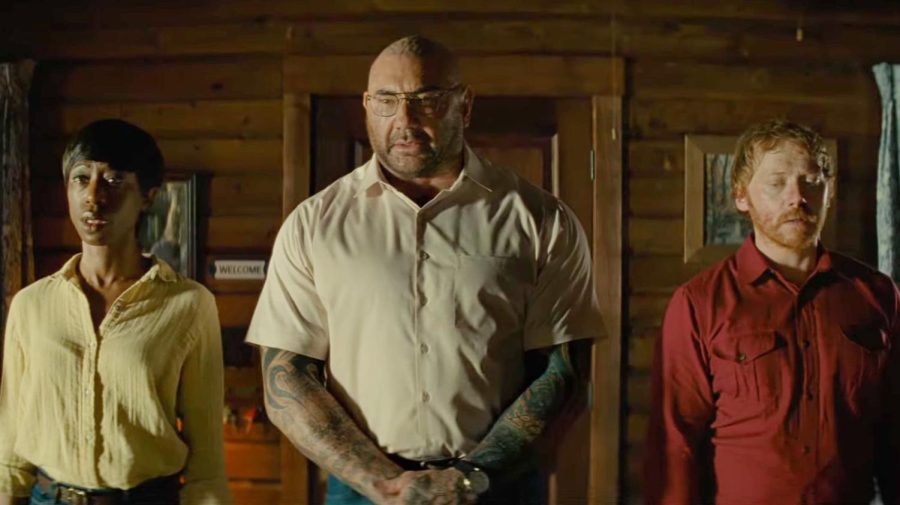It’s been nearly 24 years since M. Night Shyamalan’s “The Sixth Sense” hit theaters. The remarkably sensitive ghost thriller, with an unforgettable twist, went on to become the second-highest grossing film of the year and earned six Oscar nominations, including one for Best Picture.
It’s hard to imagine a greater level of success for a genre film director under the age of 30. But the mid-2000s turned Shyamalan’s name from a mark of quality into a joke. Despite the recent reassessment of then-critical failures like “The Village” and “Lady in the Water,” audiences revolted against his increasingly bigger stories.
More ambitious concepts and higher budgets seemingly did nothing for his reputation, having been branded as one of the worst directors in Hollywood, ever beholden to the twist gimmick that worked so naturally in “The Sixth Sense.”
This year’s “Knock at the Cabin” comes at a more complicated point in his career. The film follows a young family as they are held hostage by four mysterious and seriously disturbed people.
The captors inform the family that they must choose to sacrifice one of themselves to prevent an oncoming apocalypse. As the fathers (played by Jonathan Groff and Ben Aldridge) try to reason with the hulking leader (Dave Bautista), they realize that they may all be beyond help.
It’s a very pulpy setup, reminiscent of short horror fiction from writers like Richard Matheson and Stephen King. This is the second Shyamalan film in a row that’s adapted from a previous work, this time from the novel “The Cabin at the End of the World” by Paul G. Tremblay.
Shyamalan’s tense, emotionally transparent style is present throughout the film. It’s this style that made “Old” (an adaptation of a graphic novel by Pierre Oscar Lévy and Frederick Peeters) one of 2021’s most interesting movies. Shyamalan has found his footing once again, this time with a rolled-back budget that he largely funds himself.
What is immediately striking about “Knock at the Cabin” is its’ intimacy. Set almost entirely in the titular cabin, the story is built on the perceived sanity of its cast of characters. The film opens with the couple’s young daughter, Wen (Kristen Cui), playing in the field outside the cabin.
Her casual innocence is challenged by the arrival of Leonard (Dave Bautista), who seems polite, until the invasion begins.
After a string of films where the premise is the star (for example, the worldwide collapse in “The Happening”), Shyamalan seemingly rediscovered his greatest strength. As seen in his most successful films, Shyamalan is a master of exploring the function of love in crisis.
Looking back at a film like “Signs,” we remember it because of the terrifying alien sequences, but it stays with us because of the emotional punch that the core family brings to that story, particularly the young Abigail Breslin.
Kristen Cui gives a similarly impressive performance, bringing both innocence and a sometimes indignant confidence to her character. It would be easy to excuse a child actor for a less-than-stellar performance, but Cui genuinely delivers here.
Both Jonathan Groff and Ben Aldridge play hysteria with an open-hearted clarity. Groff’s character, Andrew, seemingly freezes in the face of the challenge, being concussed and struggling to remain calm. Aldridge’s character, Eric, shifts into a fight mentality, aggressively arguing with the captors and planning potential escape scenarios with Wen.
Their struggle to survive and deal with their captors ends up mirroring their experience trying to exist as a gay couple, particularly one who had to go through the process of adopting a child. There’s real value in presenting a gay couple who are written with depth beyond their identity.
Rarely do we get a horror or thriller film that shows the different ways people deal with everyday homophobia. The film does, however, rely on clunkier notions of homophobia later in the film. Discussing the sources of homophobia is tricky, particularly when it is not given enough time to really be discussed.
As the film continues, we learn more about the four captors. If there is one truly stand-out performance in the cast, it must be Dave Bautista. After his work in “Guardians of the Galaxy,” “Blade Runner 2049” and “Glass Onion,” Bautista has no doubt become one of the most interesting character actors currently working. His performance as Leonard is equal parts intimidating and endearing. His hulking figure belies a gentleness with his captives that makes for a bizarre and endlessly fascinating dynamic.
In learning of Leonard’s career and motivation for invading the cabin, we cannot help but sympathize to some degree. It calls to mind instances of moderate people becoming radicalized by niche media consumption. Leonard exists as a victim, but one whose status as a perpetrator cannot be excused.
The film’s ending has become a source of contention between audiences, and it’s easy to see why. While the film thrives on the tension of an unknown, whether the captors have any basis for their beliefs, the resolution of that unknown ends up feeling out of place with the rest of the story.
Shyamalan never drops the themes that are explored throughout the film, but the certainty of the finale left something to be desired. There is no room for interpretation; that means you either buy into it or are disappointed. In either case, it’s still refreshing to have a film that takes such big swings with its concepts.
“Knock at the Cabin” arrives at a time in Shyamalan’s career after “The Sixth Sense,” and post-Blumhouse Productions. It harbors the best elements of the first, while still echoing some of the missteps of his mid-career bombs. There is no doubt that the film has flaws, but it’s fascinating performances, gorgeous cinematography and direct engagement with contemporary pop psychology make it a thrilling watch.
Thomas Machacz can be reached at [email protected].




















